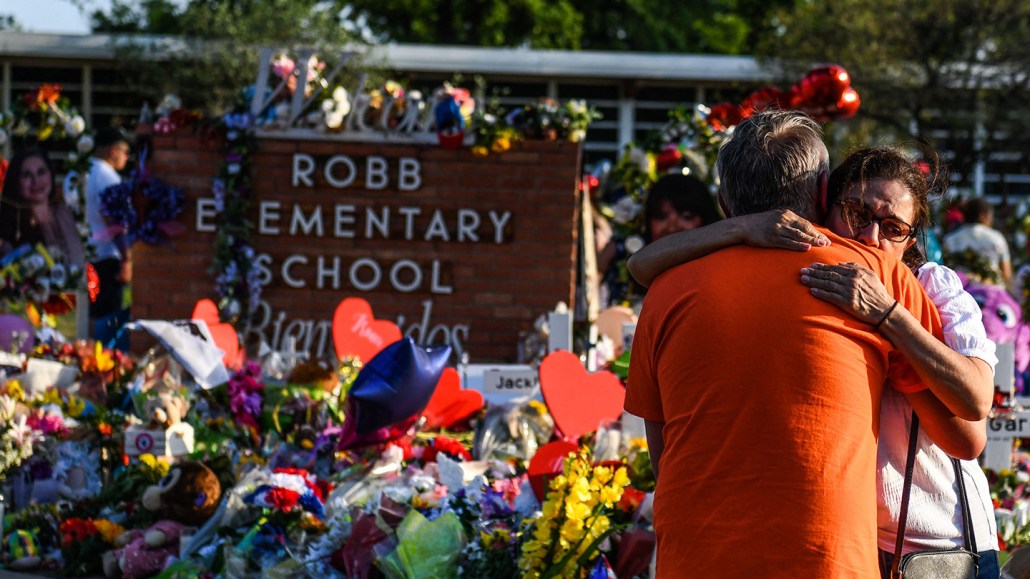The idea that many people grow following trauma may be a myth
Studies of posttraumatic growth are fundamentally flawed, researchers say

Mourners gather outside Robb Elementary School in Uvalde, Texas, on May 30, one week after a gunman killed 19 students and two teachers there. Research suggests that at least half of survivors of traumatic events will experience personal growth in the aftermath, but some psychologists call those findings illusory.
CHANDAN KHANNA/AFP via Getty Images
“What does not kill me, makes me stronger,” 19th century German philosopher Friedrich Nietzsche famously wrote. Variations of that aphorism abound in literary, spiritual and, more recently, psychological texts.
That psychological research suggests that at least half of survivors not only recover from traumatic experiences but also go on to develop more appreciation for life, stronger relationships and emotional strength — a phenomenon researchers call “posttraumatic growth.”
The idea that bad events can often lead to good outcomes is appealing, especially in this present and difficult moment. More than 6.3 million people worldwide have died from COVID-19, and deaths continue to mount (SN: 5/18/22). Russia’s invasion of Ukraine has surpassed a hundred days (SN 4/12/22). And a recent string of mass shootings — including at a July 4 parade in Highland Park, Ill., an elementary school in Uvalde, Texas, and a grocery store in Buffalo, N.Y. — has left U.S. communities reeling (SN: 5/26/22).
But in a series of talks presented in May in Chicago at the Association for Psychological Science conference, some researchers called findings of posttraumatic growth “largely illusory.” Growth studies suffer from serious methodological flaws, these researchers say. That includes a reliance on surveys that require people to assess their personal growth over time, a task that most people struggle with.
Better research tools may not remedy the problem. That’s because these studies are fundamentally flawed, the researchers say. They argue that the impetus to study trauma in terms of growth stems from a Western mind-set that tends to value positive emotions and devalue or even avoid negative emotions (SN: 12/7/19). That can pressure survivors to deny or suppress their negative feelings, which could have harmful consequences.
That yearning for positive outcomes can create “toxic cultural narratives,” says personality psychologist Eranda Jayawickreme of Wake Forest University in Winston-Salem, N.C. Referring to parents who lost a child in the Uvalde mass shooting, he says: “There is something grotesque about this expectation that people could come back from something like this.”
Focusing on the good
A half-century ago, psychologists largely treated a person’s difficulty in rebounding from traumatic events as a personal failing. But research on returning Vietnam War veterans and other trauma survivors began shifting that way of thinking. In 1980, the American Psychiatric Association created a category for posttraumatic stress disorder, or PTSD, in its manual of mental disorders. Those struggling with the disorder might experience flashbacks, nightmares and severe anxiety.
“Thirty years ago, everyone was focused on the worst outcomes,” says trauma and resilience expert George Bonanno of Columbia University.
But only about one-fifth of people who experience trauma develop PTSD, psychologists realized. In the mid-1990s, psychologists Richard Tedeschi and Lawrence Calhoun, both then at the University of North Carolina at Charlotte, wrote in the 1996 Journal of Traumatic Stress that a focus on suffering obscured the good that can emerge from trauma.
The pair developed a now widely used “growth inventory” to assess positive outcomes that people reported after experiencing a traumatic event. In the 21-item survey, respondents rate statements such as “I have more compassion for others” and “I established a new path for my life.” Respondents can choose from a score of 0 for “I did not experience this change as a result of my crisis” to 5 for “I experienced this change to a very great degree as a result of my crisis.” The items reflect five broad categories: relating to others, personal strength, new possibilities, appreciation of life and spiritual change.
“Posttraumatic growth is you go down to the depths and then at some later point, rise above that baseline into some other realm,” says Tedeschi, now the chair of Boulder Crest Institute for Posttraumatic Growth, an organization in Bluemont, Va., that uses research on posttraumatic growth to help combat veterans, first responders and their families.
Cracks in the theory
But some researchers soon began to question people’s ability to accurately respond to the growth survey.
In a now-seminal 2009 study in Psychological Science, researchers recruited about 1,500 undergraduate students and tracked them for eight weeks. Once at the start of the study and once at the end, students responded to surveys for each of the five growth categories covered by the growth inventory, along with a modified version of the inventory.
Unlike Tedeschi and Calhoun’s inventory, which asks respondents to compare their present state of mind to the past, the five surveys and modified inventory asked respondents to reflect on the present. For instance, in the relationship quality category, respondents rated the statement: “I enjoy personal and mutual conversations with family members or friends.”
During that eight-week period, 122 students reported experiencing a traumatic event that caused high levels of distress. Those students also completed the standard growth inventory at the end of the eight weeks. The researchers found no correlation between high perceived growth scores on the standard inventory and actual growth scores on the modified inventory and five surveys related to well-being.
That mismatch occurs because people are terrible at remembering how they felt in the past, says study coauthor Crystal Park, a clinical health psychologist at the University of Connecticut in Storrs. “I want to throw out the concept of people being able to accurately report that they have grown.”
Tedeschi counters that trauma cleaves one’s life into a before and after, making it more feasible for many people to distinguish changes over time. What’s more, growth takes time, he says. “You can’t expect people to change their spiritual beliefs in eight weeks.”
But how much time? And if enough time passes, how does one know that the growth arises from the trauma and not some other major life experience, like moving across the country or having children? Research shows that people are not great at introspection, Jayawickreme says. “We tend to come up with all types of stories for change, but those stories are just stories. They don’t really reflect what actually caused that change.”
‘Pulling for growth’
Other problems come with the design of the original inventory, Jayawickreme and others argue. For example, the questions account for positive changes only, and the worst or lowest outcome a respondent can give is that they experienced no change as a result of their crisis. That framing puts pressure on survivors to report growth when they may feel worse, Jayawickreme says. “The items are pulling for growth.”
Tedeschi and colleagues have recently developed a new growth survey that also accounts for negative changes following trauma. But it’s not yet as widely used in research on posttraumatic growth as the original.
Meanwhile, in unpublished work, trauma researcher Adriel Boals of the University of North Texas in Denton sought to overcome what he sees as the original survey’s growth bias in a different way. He asked people whether they changed because of a traumatic event, a measure of growth, or despite the event.
“Half the people are picking, ‘I changed despite this event,’” Boals says. That suggests that people who may report growth on the original inventory do not actually attribute that growth to the trauma but to other life experiences.
What’s more, say Jayawickreme and others, unlike most psychological surveys, which require respondents to complete a single cognitive task along the lines of “how are you doing now” or “reflect on the present,” the original growth inventory requires four cognitive tasks. Respondents must consider how they are doing at the moment and how they were doing prior to the trauma. They then must compute that difference in well-being, as well as determine if the trauma, or some other life event such as aging or having a child, caused the change.
But people don’t actually go through those steps. That finding was reported in March in Anxiety, Stress and Coping and at the May conference by Boals, Park and Elizabeth Griffith, a psychologist also at the University of North Texas.
When the team compared response times among college students taking the standard growth inventory with students taking a simplified version involving a single cognitive task, the researchers found that the students completing the standard inventory took just 8 percent longer than the other students. That equates to just a half-second longer response time per item, Boals says. “If you can go through steps 2, 3 and 4 … in half a second, you’re drinking stronger coffee than I am.”
Avoiding negative emotions
Beyond the methodological particulars, some researchers studying trauma across cultures question some Western psychologists’ focus on personal growth and, to a lesser degree, resilience — a phenomenon marked by stability during hard times, rather than a steep increase in well-being after an initial decline as observed in posttraumatic growth (SN: 10/19/14).
“In Euro-American societies, ‘resilience’ and ‘posttraumatic growth’ are commonly used metaphorical terms for positive responses to extreme adversity,” write University of Zurich psychologists Iara Meili and Andreas Maercker in 2019 in Transcultural Psychiatry. They attribute the popularity of these Western “metaphors” to individualistic societies’ emphasis on self-determination and agency, even in the face of illness or death. These concepts exist elsewhere, Maercker says. But they rarely take on such outsize significance — what he calls “almost a religious approach.”
A societal expectation of growth can put tremendous pressure on survivors to hide their suffering, Jayawickreme says.
Take, for instance, a study where researchers compared outcomes among about 380 Norwegian soldiers who deployed to Iraq in 2004. Soldiers who reported the most personal growth five months after returning home also reported the most posttraumatic stress symptoms 10 months later, researchers noted in 2015 in Clinical Psychological Science.
“Self-reports of posttraumatic growth should be highly correlated with doing well on other measurements, like less depression, more satisfaction with life, those types of things,” says Boals, who was not involved with this research. “But if anything, [growth] is positively correlated with PTSD symptoms.”
Ultimately, the most compassionate response to suffering is to validate survivors’ feelings, Jayawickreme says. “How people respond to adversity is nuanced. People can change in positive ways. People can change in negative ways. People cannot change at all. And that’s fine.”







